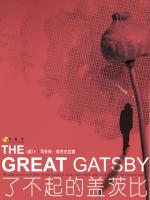The poor dreamers in America
<The Great Gatsby> is a novel written by Francis Scott Key Fitzgerald, which shows us a ruthless world in American in 1920s. The protagonist of this novel, Gatsby, is one of dreamers in America, who stretch his arms toward the dark only wish to catch the single green light at the opposite of sea.
The novel opens in West Egg, Long Island, with the viewing of Nick, who is the narrator of the whole story. He rented a house next to the mansion of Gatsby, who was the host of regular parties. After being friend with Gatsby, Nick knew that Gatsby loved his cousin, Daisy, deeply. When Gatsby was young, he was a penniless second lieutenant. He fell in love with Daisy, a beautiful and lively girl, at the first sight. But they finally separated because of war. Five years later, Gatsby came back with honor and money, but Daisy had been married with Tom. So Gatsby decided to win Daisy back. Unfortunately, Gatsby was so closed to that green light but he still couldn’t catch it. At the end of the story, he was killed and only Nick was on Gatsby’s side.
So why did Nick, or the author, call our protagonist the Great Gatsby? In my opinion, that’s because of his insistence and his innocent. Gatsby was poor when he was young, but after he met Daisy, he began to fight for being good enough for Daisy. Five years later, he become a rich, gentleman, but he still saw Daisy as the only green light in his heart, and never changed till his death. He kept his love, his dream, for a long time but he fell in love with a wrong person. This was what I respected but sympathized him.
Gatsby was a typical dreamer in America at that time. He believed his green light can bring him a better future, but the truth is that his dream bring him to death. When the bullet went through Gatsby’s heart, his dream broken in to pieces at the same time. Through believe his dream may lead him to dying, but he still chased that green light. Like the ending said. ”Gatsby believed in green light, the orgastic future that year by year recedes before us. It eluded us then, but that’s no matter, tomorrow we will run faster, stretch out our arms farther… And one fine morning. So we beat on, boats against the current, borne back ceaselessly into the past.”



 京公网安备 11010802032529号
京公网安备 11010802032529号